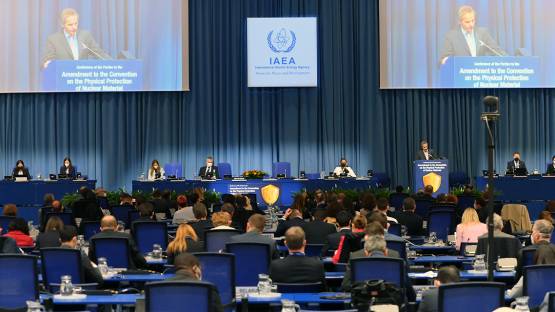Nearly six years since entry into force of the 2005 Amendment to the Convention on the Physical Protection of Nuclear Material (CPPNM), the IAEA is hosting the first conference to review its implementation and its adequacy.
“We are gathered for a significant milestone in international nuclear security: for the first time the Parties to the Amendment to the CPPNM, now numbering 129, are reviewing the implementation and the adequacy of the only legally binding undertakings covering the physical protection of nuclear material and facilities,” said IAEA Director General Rafael Mariano Grossi in his opening remarks, reflecting on the importance of the Amendment to the Convention on the Physical Protection of Nuclear Material (A/CPPNM).
During the weeklong conference, the delegations of the A/CPPNM Parties will share their experiences in the implementation of the A/CPPNM, including steps taken to ensure robust physical protection of nuclear facilities and nuclear material, efforts taken to increase international cooperation, and actions implemented to criminalize offences involving nuclear material or facilities.
Side events organized on the margins of the Conference will also provide an opportunity for further discussion of different aspects of nuclear security and the Convention as amended. One of the side events, jointly organized by the IAEA and Canada, is specifically dedicated to the A/CPPNM universalization challenges and success stories.
The CPPNM currently has 164 Parties. There are still 35 Parties to the original Convention that have not yet joined the Amendment. Twenty-nine States have not yet joined the original Convention or the Amendment. “This conference is an opportunity to create momentum for further universalization. […] This conference is also an opportunity for Parties to underline their commitment to advancing nuclear security in general,” said Ambassador Benno Laggner of Switzerland, Co-President of the conference. Ambassador Suleiman Dauda Umar of Nigeria, Co-President of the Conference, added: “We hope that the purpose of nuclear power shall be limited to the peaceful uses and the economic development of Member States, and we also hope that most States will bring into force the A/CPPNM.”
Representatives from several international organizations and non-governmental organizations, approved by the Parties to the A/CPPNM to participate in the Conference, are present as observers.






